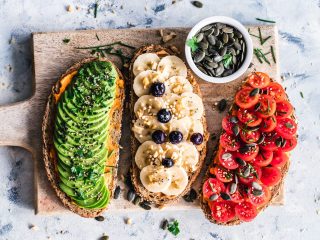Your heart is probably the hardest-working muscle in the body. Firstly, every day, it beats around 115,000 times. Secondly, it pumps over 7,500 liters of oxygen-rich blood daily. It is also one of the most vital organs keeping us alive – but we rarely think of it unless it is giving us problems. This World Heart Day, we shed light on this incredible organ and focus on its vital functions for our body.
The Mayo Clinic has put forth their Healthy Heart Plan, contained in the book Mayo Clinic Healthy Heart for Life. Basically, the plan focuses on nutrition, movement, and sleep to take care of your heart.
The summary of the plan looks as follows:
1. Eat 5

Photo by Ella Olsson on Unsplash
The plan recommends eating around five servings of fruit and vegetables daily in order to boost heart health. Get a head start on breakfast by including at least one serving of fruit or vegetable. Make a point of snacking on fruits and veggies in between meals. And make it easier for yourself by cutting up pieces of fruits and veggies and storing them in the fridge. For example, a delicious snack is carrot or cucumber pieces paired with fresh hummus or tzatziki dip.
The following nutrients are considered particularly important when it comes to protecting your heart health:
-
Beta-glucan
This nutrient can help to lower LDL (“bad”) cholesterol and total cholesterol levels. These are associated with the risk of heart disease. You can find it in barley, certain types of mushrooms, some types of seaweed, oats, and baker’s yeast.
-
Antioxidants
Free radicals, if not stopped, can cause cell damage to the body. Antioxidants prevent this from happening by binding themselves to oxidants. When this happens, they deactivate free radicals. Antioxidants are found in onions, garlic, leeks, pumpkin, mangoes, apricots, carrots, tea, spinach, and oats.
-
Fibre
Research shows that fibre has near-super-powers when it comes to aiding a healthy heart and reducing the risk of heart disease. Some even call it the key to longevity. It can lower blood pressure, improve blood lipid profiles, improve insulin sensitivity, help maintain healthy body weight and reduce inflammation. You can find it in berries, apples, oranges, pears, oats, barley, beans, and nuts.
-
Magnesium
You might not even be aware of how important magnesium is to your body. It is responsible for no less than 300 biochemical reactions in your body. Nerves and muscle function are dependent on magnesium, as is a steady heart rhythm. Researchers also linked sufficient magnesium to a lower risk of cardiovascular disease. You can find it in high amounts in everything from black beans, barley, oats, almonds, pumpkin, sesame seeds, spinach, soy, and tofu.
-
Folate
Folate is an important nutrient when it comes to regulating the levels of amino acids in the body. You can find it in mint, spinach, Bengal, green and black gram, and soy.
2. Move 10
Exercise is very important for your heart health. To illustrate, research shows that only 60 to 90 minutes of exercise a week has the power to reduce your risk for heart disease by up to 50%. In addition to making time to exercise, you should focus on working it into your day by adding 10 minutes of moderately intense physical activity to what you do every day.
Exercise should be natural and enjoyable. Find something that you like to do, and make it easier for yourself by making it a group activity. Some ideas to incorporate exercise into your daily life:
- opt for the stairs instead of the lift whenever you can
- park at the far end of the parking lot and get some extra steps in
- ride your bike or walk rather than driving, if possible
3. Sleep 8 for better heart health
Sleep is something that people in the 21st century get less and less of, particularly as a result of the effects of blue light and an increasingly stressful lifestyle abound. Without sufficient sleep, your risk for heart disease and heart attack goes up dramatically.
Harvard Health cites the following reasons for a lack of sleep:

Can you sleep yourself younger?
- sleep apnea
- diet (excess caffeine, eating spicy foods that can lead to heartburn, eating too late)
- lack of exercise
- pain
- restless leg syndrome
- depression
- poor sleep habits (staying up too late, not sticking to a regular sleep schedule)
If you consistently struggle with getting your recommended eight hours of sleep, it might be time to focus on your lifestyle and habits. Try to avoid caffeine after 6 PM, sticking instead to chamomile tea. Opt for an early-morning workout that will get your body ready for bed. Diffuse essential oils like lavender an hour before bed. Take a warm bath with mineral salts to relax both the body and mind.
Here are some more sleep tips to find out how you can counter stress and sleepless nights.
References:
Grogan M, et al. Eat 5, Move 10, Sleep 8. In: Mayo Clinic Healthy Heart for Life! New York, N.Y.: Time Home Entertainment Inc.; 2012.
The American Heart Association’s diet and lifestyle recommendations. American Heart Association. http://www.heart.org/HEARTORG/HealthyLiving/HealthyEating/Nutrition/The-American-Heart-Associations-Diet-and-Lifestyle-Recommendations_UCM_305855_Article.jsp#.WZsZcVGQxpg. Accessed Aug. 21, 2017.
Physical Activity Guidelines Advisory Committee report. Part G. Section 2: Cardiorespiratory health. Office of Disease Prevention and Health Promotion. http://www.health.gov/paguidelines/report/G2_cardio.aspx. Accessed Aug. 21, 2017.
Douglas PS. Exercise and fitness in the prevention of cardiovascular disease. https://www.uptodate.com/contents/search. Accessed Aug. 21, 2017.
American Heart Association recommendations for physical activity in adults. American Heart Association. http://www.heart.org/HEARTORG/HealthyLiving/PhysicalActivity/FitnessBasics/American-Heart-Association-Recommendations-for-Physical-Activity-in-Adults_UCM_307976_Article.jsp#.WZsaQlGQxpg. Accessed Aug. 21, 2017.
How much sleep is enough? National Heart, Lung, and Blood Institute. https://www.nhlbi.nih.gov/health/health-topics/topics/sdd/howmuch#. Accessed Aug. 21, 2017.
Harvard Health Publishing. 8 reasons why you’re not sleeping. https://www.health.harvard.edu/sleep/8-reasons-why-youre-not-sleeping





![women [longevity live]](https://longevitylive.com/wp-content/uploads/2020/01/photo-of-women-walking-down-the-street-1116984-100x100.jpg)









